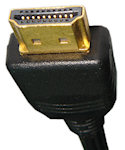FREQUENTLY ASKED QUESTIONS
AV (Audio/Video)
| Q. | Are older analogue TV boosters compatible with newer digital 'Freeview' services? |
|
|||||||||||||||||||||||||||||||||||||||||||||||||||||||||||||||||||||
| A. | Yes, older analogue TV boosters should all work in exactly the same way as they did for analogue TV signals. This is because the digital 'Freeview' service is still based on standard UHF frequencies. The only difference is for any one UHF frequency (or carrier) you may have several channels multiplexed digitally...this is why you are able to get many more TV channels. | ||||||||||||||||||||||||||||||||||||||||||||||||||||||||||||||||||||||
| Q. | How important are spiked feet on speakers? |
|
|||||||||||||||||||||||||||||||||||||||||||||||||||||||||||||||||||||
| A. | One thing to be clear about is
that spiked feet do not help reduce vibrations
between the speaker and floor, they in fact create a
more definite link to the floor and in doing so
increase vibrations significantly. If you want less
vibrations simply use rubber feet as these should do
a much better job of isolating the sound energy. Spiked feet do enhance speaker stability, providing the speaker with definite contact with the floor, this stops tiny speaker movements that could otherwise compromise sound quality, especially low-frequency sounds (or base response). |
||||||||||||||||||||||||||||||||||||||||||||||||||||||||||||||||||||||
| Q. | How important is the type of speaker cable? |
|
|||||||||||||||||||||||||||||||||||||||||||||||||||||||||||||||||||||
| A. | Your speaker cable choice will
ultimately depend on your speakers: All speakers have an impedance rating (in ohms), this normally represents the lowest impedance value and defines how easily they are driven by your amplifier, thus lower impedance speakers are harder to drive. In this case you would strive to purchase the lowest resistance cable your can find. A heavier gauge cable (multi-strand or otherwise) will provide a low overall resistance, with silver based cables attaining a lower resistance when compared to the same gauge of copper. Interestingly enough 'oxygen free' copper cable makes very little difference to overall resistance when compared to a similar gauge of standard copper. Lower frequencies (20 Hz) have lower impedances (3 ohms), so if your speakers have a truly wide frequency response that gets close to these lower frequencies, but have, say, a nominal 4 ohm rating, you may need heavy gauge (dare I say silver) cable to attain a cleaner low register from your speakers. Heavy gauge solid core copper wire can be used, but this tends to be more difficult to manage due to its rigidity! Ultimately, expensive speaker cables should only be needed for higher quality systems, but as with all things HiFi, let your ears do the purchasing! |
||||||||||||||||||||||||||||||||||||||||||||||||||||||||||||||||||||||
| Q. | How important is the Centre speaker in my surround sound system? |
|
|||||||||||||||||||||||||||||||||||||||||||||||||||||||||||||||||||||
| A. | Few people realize just how
important the centre speaker is in a surround sound
system. When it comes to movies most if not all
dialogue is presented to the centre speaker, the
centre speaker also conveys sounds which pan across
the main stereo pair. All this helps create a
seamless front sound stage. It is very important to select a centre speaker that uses identical drive units to the main front (stereo) pair, this ensures a sonic match. (This is why speakers are often sold in packages, as this helps guarantee a matched sound stage) It is also desirable to make sure the centre speaker is at a similar height to the main stereo front speakers; but placement compromises are sometimes unavoidable with people having to tilt their centre speakers up/down a little because height placement is either difficult or simply impractical. Almost all centre speakers a designed with a number of drive units mounted horizontally, this creates a smaller easier to locate centre speaker, but this design will always have inherent sonic issues with sound waves tending to interact more with the ceiling and floor rather than radiate cleanly across a room. This is why purest will always strive for the ultimate configuration of another vertical speaker which is identical to the main stereo front pair. Unfortunately this is often expensive and, more often than not, impractical for the average living room. |
||||||||||||||||||||||||||||||||||||||||||||||||||||||||||||||||||||||
| Q. | Do I need a TV license to use the BBC's iPlayer software? |
|
|||||||||||||||||||||||||||||||||||||||||||||||||||||||||||||||||||||
| A. | You do not need a TV
license to use the BBC's iPlayer service, this is
chiefly because iPlayer only offers up on-demand
content. Currently the Communications Act 2003 and
the Communications Regulations 2004 (Television
Licensing) do not cover on-demand, streamed content,
thus the BBC would have to ask the government to
change/update the Act to cover this. This is a possibility for the future, but is unlikely to happen unless the BBC starts to offer significant numbers of programmes via iPlayer in real-time (or near real-time). |
||||||||||||||||||||||||||||||||||||||||||||||||||||||||||||||||||||||
| Q. | What size of High Definition (HD) Flat panel TV screen should I go for ? |
|
|||||||||||||||||||||||||||||||||||||||||||||||||||||||||||||||||||||
| A. | Some would argue that a large
sized TV screen might end up dominating a living
room, but I think a lot depends on the position of the set
and how it's installed. For instance, a screen will
have significantly less impact on a room if it is
situated in a alcove or mounted in a
recess on the wall. Screen size will depend on a number of factors, including your room shape & size, the position of your furniture and ultimately the distance you will be sat from the display. The following is meant as a basic guide to the sorts of sizes you should be looking at depending on the distance you will be sitting from the screen:
|
||||||||||||||||||||||||||||||||||||||||||||||||||||||||||||||||||||||
| Q. | What is an HDMI cable and how much should I pay for one ? | ||||||||||||||||||||||||||||||||||||||||||||||||||||||||||||||||||||||
| A. | HDMI stands for High Definition
Media Interface, this interface is designed to carry
uncompressed digital media data. An HDMI cable is a
lead that carries this digital data from a source
(e.g. Blu-ray player or up-scaling DVD player) to
a display device (e.g. LCD or Plasma TV). Think of it
as the digital HD version of a SCART lead. Analogue based data communications are susceptible to interference and signal degradation, so it is often important to select good quality interconnects to reduce these effects, but it is a lesser known fact that HDMI cables can also suffer from similar issues, see the question on 'Cheap HDMI cables' below! A basic HDMI cable should cost no more than around £10, if you want a better quality cable then look for out for 'Tech+Link' Wires CR range of leads, a 1.5M cable should cost no more than £24. If you really want ultimate quality then go for 'The Chord Company' 1.3 Silver Plus leads, but a 1.5M cable will not be cheap at around £70, but this last option should only be considered for higher end systems. |
||||||||||||||||||||||||||||||||||||||||||||||||||||||||||||||||||||||
| Q. | Is there really any difference between a cheap HDMI cable and an expensive one ? | ||||||||||||||||||||||||||||||||||||||||||||||||||||||||||||||||||||||
| A. | Many people feel it's not worth going
'over the
top' with expensive HDMI cables, but before you opt for that cheap £8 HDMI cable,
there are a few general technical points to
consider that might change your mind: Even though an HDMI cable handles digital, binary data (naughts and ones), it does so via an electrical signal in the form of high and low voltages, and much like analogue based signals these voltages can be affected by interference. The high transmission speed of data over HDMI (10.2 Gbit/s (340 MHz)) makes it more likely to suffer from attenuation. HDMI video data does not include any error correction, this means video data errors can occur (although they are rare). Longer cable runs will increase electrical resistance, and can also increase the possibility of interference. Generally speaking, dearer HDMI cables will have a higher quality construction, reducing the possibility of interference due to correctly shielded conductors, cable damage (twisting and pinching) due to better cable protection and slack/weak connectors due to higher precision manufacturing. Ultimately, my advise is simple, if you are going to invest in an expensive, high quality HDMI cable, make sure you try before you buy to ensure your application requires such a cable! |
||||||||||||||||||||||||||||||||||||||||||||||||||||||||||||||||||||||

